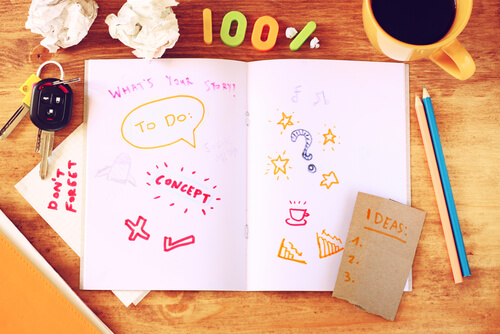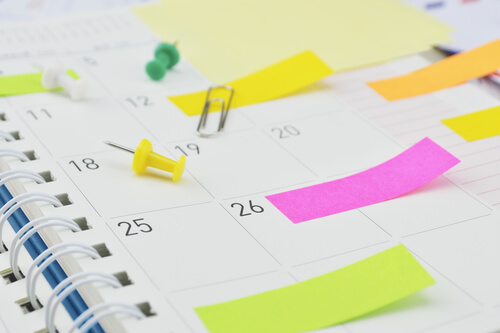Multitasking Madness: Too Many Things at Once

We live in an incredibly fast-paced world. Transportation and communication between people and places have evolved so that we can be closer than ever in the shortest time possible.
We are growing more and more accustomed to a life full of screens, messages, sounds, and conversations that are going on all at once. These things cut down the distances between us, but at the same time they weigh us down with distractions, tasks, and things to do.
So, what are the consequences of multitasking? What happens to us when we try to do way too many things at once?
Multitasking: What happens when we do too many things at once?
Multitasking is trying to take on many different tasks at the same time. This can actually make us less productive than we have the potential to be. If we are multitasking, we are not able to concentrate on one task and follow it through to the end.
In a society that has become more and more immediate, we need answers and results that are fast and accurate. In this ocean of information, we have to select the tasks that are most relevant and concentrate all of our attention on them.

The human brain, that organ that is so incredible and mysterious, does have its limits. It seems that managing a large amount of information makes us collapse in on ourselves and causes us to make more mistakes in whatever we are trying to do.
The result is that, at the end of the day, we may sit down, after having been sitting down all day, and feel as if we have not really done anything all day but still feel exhausted.
Quality over quantity
To avoid feeling like we are a weather-vane that turns at the mercy of the wind, we must plan our day and give ourselves realistic objectives. These objectives should be clear and of moderate difficulty.
In order to do that effectively, it is always good to have an agenda or planner on hand in which we can list and check off the things we have already done, and comprehensively lay out what we still need to do.
It can also be helpful to categorize these daily activities/tasks. For example:
- Work: realistic tasks that must be completed at work
- Social: messages to family and friends, planned commitments, updating social networks
- Leisure: Sports, dancing, music, meditation, etc…
By doing this, we make our day and our tasks more concrete. We are able to organize ourselves more efficiently, so that we can maximize our productivity, and never feel like we are falling behind or forgetting something.
If we want to do everything, we won’t do anything
We cannot do everything. That is a reality we must all accept. Sometimes we set too many goals for ourselves that we expect ourselves to finish in just one day. However, the plan may be unrealistic and we will never get it all done.
That is when we start to feel disappointment. Instead of feeling accomplished for what we have done, we find ourselves saying things like: “I didn’t get it done…”, “I wasted my time…”, “I can’t do anything…”.

It is better to choose fewer things to do, and to do each of them well. It is also important to say no to the things we know we won’t be able to do, which includes being wise about plans and promises we make to people around us.
Although there are times in which we must be there for someone else, there are also times in which it is best to simply give a sincere explanation and offer a more realistic alternative.
Focus on each step
In order to reach the end of the road, we have to enjoy each and every step of the journey. We have to do our best to enjoy each motion we have to go through to reach a goal, without thinking too much about the future result. That is the key to being able to do something well.
Of course, we have to maintain our hope, but we often anticipate future failure. Instead of helping us, this can paralyze us and stop us from trying something altogether.
The result of multitasking is that we leave the tasks we have set out to do half done, and leave questions unanswered. When this happens, we can start to feel anxiety and like we have things hanging over us that need to be done.
When these things start to build up, a combination of thoughts like “I should have done this…”, “I don’t know how to handle this…” and “I’ll never get this done…” overtake us and make us even more inefficient. They also cause our perception to change and make us feel like we are spending more, and too much, time on one specific thing. This downward spiral can lead to frantic, inefficient multitasking.
Reclaim quiet time
In this world full of different stimuli, it sometimes feels like we have forgotten about silence. Silence is an amazing opportunity to feel free.
Cars, alarms, the news, notifications all inundate our day to day life, making our brain change its focus every few seconds to be able to address everything that is calling its attention.
Silence, however, is not only helpful for relaxing our ears, but also for distancing ourselves from the sights, sounds, and smells of the city and busy life. Immersing ourselves in silence allows us to distance ourselves completely from all stimulants, except our own.
We need the equivalent of what areas like protected forests and wetlands need: we need our mental ecosystem to be taken care of.
In conclusion, set concrete goals, organize your days, and give yourself some quiet time so you can give yourself the chance to be as productive and efficient as possible. Instead of having lots of different things to do and feeling the pressure of multitasking, choose and focus on what you want, and what is realistic.
We live in an incredibly fast-paced world. Transportation and communication between people and places have evolved so that we can be closer than ever in the shortest time possible.
We are growing more and more accustomed to a life full of screens, messages, sounds, and conversations that are going on all at once. These things cut down the distances between us, but at the same time they weigh us down with distractions, tasks, and things to do.
So, what are the consequences of multitasking? What happens to us when we try to do way too many things at once?
Multitasking: What happens when we do too many things at once?
Multitasking is trying to take on many different tasks at the same time. This can actually make us less productive than we have the potential to be. If we are multitasking, we are not able to concentrate on one task and follow it through to the end.
In a society that has become more and more immediate, we need answers and results that are fast and accurate. In this ocean of information, we have to select the tasks that are most relevant and concentrate all of our attention on them.

The human brain, that organ that is so incredible and mysterious, does have its limits. It seems that managing a large amount of information makes us collapse in on ourselves and causes us to make more mistakes in whatever we are trying to do.
The result is that, at the end of the day, we may sit down, after having been sitting down all day, and feel as if we have not really done anything all day but still feel exhausted.
Quality over quantity
To avoid feeling like we are a weather-vane that turns at the mercy of the wind, we must plan our day and give ourselves realistic objectives. These objectives should be clear and of moderate difficulty.
In order to do that effectively, it is always good to have an agenda or planner on hand in which we can list and check off the things we have already done, and comprehensively lay out what we still need to do.
It can also be helpful to categorize these daily activities/tasks. For example:
- Work: realistic tasks that must be completed at work
- Social: messages to family and friends, planned commitments, updating social networks
- Leisure: Sports, dancing, music, meditation, etc…
By doing this, we make our day and our tasks more concrete. We are able to organize ourselves more efficiently, so that we can maximize our productivity, and never feel like we are falling behind or forgetting something.
If we want to do everything, we won’t do anything
We cannot do everything. That is a reality we must all accept. Sometimes we set too many goals for ourselves that we expect ourselves to finish in just one day. However, the plan may be unrealistic and we will never get it all done.
That is when we start to feel disappointment. Instead of feeling accomplished for what we have done, we find ourselves saying things like: “I didn’t get it done…”, “I wasted my time…”, “I can’t do anything…”.

It is better to choose fewer things to do, and to do each of them well. It is also important to say no to the things we know we won’t be able to do, which includes being wise about plans and promises we make to people around us.
Although there are times in which we must be there for someone else, there are also times in which it is best to simply give a sincere explanation and offer a more realistic alternative.
Focus on each step
In order to reach the end of the road, we have to enjoy each and every step of the journey. We have to do our best to enjoy each motion we have to go through to reach a goal, without thinking too much about the future result. That is the key to being able to do something well.
Of course, we have to maintain our hope, but we often anticipate future failure. Instead of helping us, this can paralyze us and stop us from trying something altogether.
The result of multitasking is that we leave the tasks we have set out to do half done, and leave questions unanswered. When this happens, we can start to feel anxiety and like we have things hanging over us that need to be done.
When these things start to build up, a combination of thoughts like “I should have done this…”, “I don’t know how to handle this…” and “I’ll never get this done…” overtake us and make us even more inefficient. They also cause our perception to change and make us feel like we are spending more, and too much, time on one specific thing. This downward spiral can lead to frantic, inefficient multitasking.
Reclaim quiet time
In this world full of different stimuli, it sometimes feels like we have forgotten about silence. Silence is an amazing opportunity to feel free.
Cars, alarms, the news, notifications all inundate our day to day life, making our brain change its focus every few seconds to be able to address everything that is calling its attention.
Silence, however, is not only helpful for relaxing our ears, but also for distancing ourselves from the sights, sounds, and smells of the city and busy life. Immersing ourselves in silence allows us to distance ourselves completely from all stimulants, except our own.
We need the equivalent of what areas like protected forests and wetlands need: we need our mental ecosystem to be taken care of.
In conclusion, set concrete goals, organize your days, and give yourself some quiet time so you can give yourself the chance to be as productive and efficient as possible. Instead of having lots of different things to do and feeling the pressure of multitasking, choose and focus on what you want, and what is realistic.
This text is provided for informational purposes only and does not replace consultation with a professional. If in doubt, consult your specialist.







